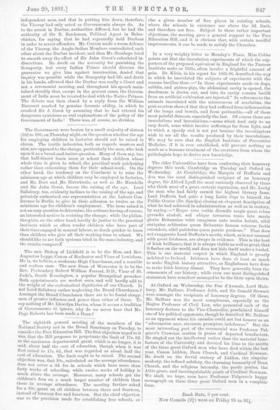The Government were beaten by a small majority of sixteen
(202 to 186) on.Thursday night, on the question whether the age for employing children in factories should not be raised to eleven. The textile industries, both as regards masters and men, are opposed to the change, particularly the men, who look upon it as a bread-and-butter question. Many of them say, too, that half-timers learn more at school than children whose whole time is given to school, the practical work quickening 'rather than exhausting them for their school-work. On the other hand, the tendency on the Continent is to raise the minimum age at which children may be employed in factories, and Mr. Burt and gr. Birtwhistle, as well as Mr. Mundella and Sir John Gorst, favour the raising of the age. Lord Salisbury, too, evidently inclines to the raising of the age, and privately authorised our representatives at the Labour Con- ference in Berlin to give in their adhesion to twelve as the minimum age for children's employment. The issue raised is not an easy question to determine, the artisans having, of course, an interested motive in resisting the change ; while the philan- thropists, on the other hand, hardly do justice to the practical instincts which so often render children who have part of their time engaged in manual labour, so rhuch quicker to learn than children who give all their working-time to school. We should like to see both systems tried in the same industry, and the results compared!


































 Previous page
Previous page